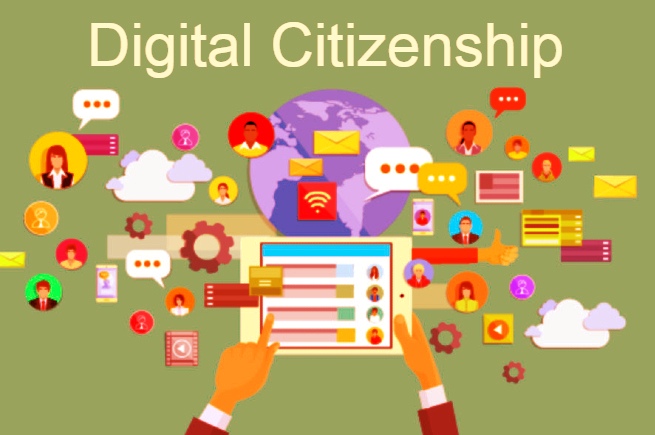The article discusses the importance of digital citizenship and media ethics in education. It explores the ways in which technology has transformed the way we communicate and access information, and how this has led to the need for digital literacy and media literacy skills.
The article examines the role of schools in promoting digital citizenship and media ethics and highlights some of the challenges and opportunities that arise in this context. Ultimately, the article argues that the cultivation of digital citizenship and media ethics is essential for students to become responsible and ethical users of technology.
As technology continues to transform the way we live, work, and learn, the need for digital citizenship and media ethics in education has become increasingly important. With the rise of social media, online communication, and digital media, students are more exposed than ever to a range of digital tools and platforms that can both empower and challenge them.
Digital citizenship and media ethics refer to the practices, skills, and attitudes that enable students to engage with these tools and platforms in a responsible and ethical manner.
In this article, we will explore the concept of digital citizenship and media ethics in education, and how they can be fostered in schools. We will examine the challenges and opportunities that arise in this context, and highlight some best practices and strategies for promoting digital literacy and media literacy skills among students.
Ultimately, our goal is to provide educators with a comprehensive understanding of digital citizenship and media ethics and to equip them with the tools and resources they need to cultivate these skills in their students.
The Importance of Digital Citizenship
Digital citizenship refers to the responsible and ethical use of technology, including the internet, social media, and digital devices.
As technology continues to evolve and play an increasingly important role in our lives, the need for digital citizenship has become more urgent. Digital citizenship encompasses a range of skills, including online safety, privacy, and security, as well as the ability to navigate digital tools and platforms effectively and responsibly.

In the context of education, digital citizenship is particularly important. Schools have a responsibility to teach students how to use technology in a way that is safe, responsible, and ethical.
This involves providing students with the knowledge and skills they need to navigate the digital landscape, as well as the critical thinking skills required to evaluate the accuracy and reliability of digital information.
Promoting Digital Citizenship in Schools
Schools can play an important role in promoting digital citizenship among students. There is a range of strategies that educators can use to cultivate digital literacy skills, including providing students with access to digital tools and platforms, teaching them how to use these tools responsibly and effectively, and incorporating digital literacy into the curriculum.
One effective approach is to teach digital citizenship through project-based learning. This involves giving students hands-on experience with digital tools and platforms and encouraging them to explore and experiment in a safe and supportive environment.
Another approach is to integrate digital citizenship into existing curriculum areas, such as English, social studies, or science. This can help students to see the relevance and importance of digital citizenship skills in real-world contexts.
The Role of Media Ethics in Education
Media ethics refers to the principles and practices that guide responsible and ethical communication in the media. As with digital citizenship, media ethics is particularly important in the context of education. Schools have a responsibility to teach students how to communicate effectively and ethically, both online and offline.
Media ethics involves a range of skills, including the ability to identify and evaluate different types of media, the ability to communicate effectively and respectfully, and the ability to navigate complex ethical issues related to media production and consumption.
In order to cultivate media ethics among students, educators must provide them with the knowledge and skills they need to critically evaluate media content and to communicate effectively and respectfully.
Promoting Media Ethics in Schools
There is a range of strategies that educators can use to promote media ethics among students. One effective approach is to incorporate media literacy into the curriculum.
This involves teaching students how to analyze and evaluate media messages, and how to produce media content that is informative, ethical, and respectful. Media literacy can be integrated into a range of subject areas, including English, social studies, and art.
Another approach is to provide students with opportunities to engage with media in a creative and ethical manner.
For example, students could be tasked with creating a public service announcement that promotes a positive message, or with producing a short film that addresses an important social issue. By engaging in these types of activities, students can develop their media literacy skills while also making a positive impact on their communities.
Challenges and Opportunities
While there are many opportunities for promoting digital citizenship and media ethics in education, there are also a number of challenges that must be addressed.
One of the biggest challenges is the rapid pace of technological change, which can make it difficult for educators to keep up with the latest tools and platforms. Another challenge is the issue of digital equity, as not all students have access to the same resources and opportunities.

Despite these challenges, there are also many opportunities for promoting digital citizenship and media ethics in education.
For example, the rise of social media has created new opportunities for students to engage in collaborative and creative projects, and to connect with peers and experts from around the world.
Additionally, the growing emphasis on digital literacy and media literacy in education has led to the development of a wide range of resources and tools that can be used to support these skills.
Conclusion
In conclusion, digital citizenship and media ethics are essential skills for students in today’s digital age. Schools have a responsibility to teach students how to navigate the digital landscape in a responsible and ethical manner and to communicate effectively and respectfully in a variety of media contexts.
By promoting digital literacy and media literacy skills among students, educators can help to prepare them for success in the 21st century and to become responsible and ethical citizens of the world.









